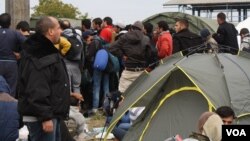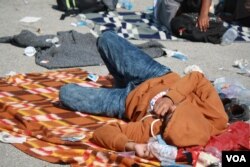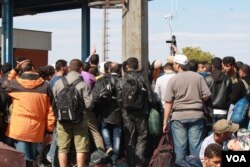"All the men wear pants like this,” said Soaid, indicating with his hand that the pants needed to be long enough to cover the ankles. “And the women stay inside."
As he waited in a crowded line of refugees and other migrants, hoping to board yet another bus, Soaid said he had escaped Deir Ezzor, a province in Syria mostly controlled by Islamic State militants, only a week or two ago.
Since then, he said, he had already passed through Turkey, Greece, Macedonia and Serbia on his way to Germany, the Netherlands or Sweden. He stared at the masses of people, not sure what he had to do to get a bus, and anxious to be on his way.
“We don’t call them Islamic,” he said. “They are Daesh.” In Arabic, the acronym "Daesh" indicates the group is criminal, as opposed to committed to Islam. For many families risking their lives to escape the militant group, Daesh is a nightmare, and calling them “Islamic” is insulting.
Soaid wore a red baseball hat given to him earlier in the day by aid workers. He lit a cigarette to pass the time, and offered one to me.
“Can you smoke in Deir Ezzor?” I asked. When the militants first swept through Syria, people who fled the area reported strict smoking bans.
“Inside your house you can smoke, but it’s forbidden outside,” he said. “Or else they cut.” He mimed a knife cutting off a hand.
Then leaned in and whispered: “But you know who I buy my cigarettes from? Of course, you know, it’s Daesh.” We both laughed at the hypocrisy, but then Soaid’s voice turned faraway.
“Many things are still like normal there,” he added. “But last week a woman was stoned to death. She was a vocal critic.”
Fear follows to Europe
As the day dragged on, the sun grew hot and for hours there was no sign the weary travelers would be let inside, where they were told there was food, shelter and medical care.
While other young men removed sweaters and plastic pants they had worn to sleep outside the night before, Mohammed, 24, kept on his black jacket and skullcap.
He kept his head down as television journalists passed by, afraid of being caught on camera.
“They killed my cousin, friends and other relatives in Mosul,” he said when I asked why he was scared. “Four of my colleagues have disappeared.”
In Iraq, Mohammed had been a journalist before Daesh took over, but now journalism is considered a crime. The Internet is cut off and mobile phone lines are mostly blocked, he said.
“I’ve never seen so much power,” he added as he looked around warily. “I’m terrified still.”
But Mohammad wasn’t afraid militants would find him — he was afraid they would find the family he left behind.
In Daesh-controlled Mosul, he said, you are supposed to report to militants if you are leaving the city. A friend or relative is appointed as your guarantor, and if you don’t return within roughly two weeks, that person can be killed or arrested, according to Mohammed.
Mohammed’s family was searched and questioned within days after he fled. But with no indication that his family even knew he had left, they remained unharmed and were in touch on “illegal” Internet connections every few weeks.
However, if Mohammed turned up in a picture or a video in Croatia, he thought Daesh would know: He left Mosul with money and a plan.
“They have more information than American intelligence,” he said.
The threat of violence kept Mohammed’s head down, but it wasn’t just the violence that drove him out of Mosul. Like most other journalists, he lost his job when Daesh moved in and couldn’t find another.
“If you want to work,” he said, “you have to work for Daesh.”
International police forces
A group of young Syrian men must have heard us talking, and joined in the conversation while Mohammed quietly drifted away.
“We came from Daesh,” said Naseem, 20, flopping his arm over his buddy’s shoulder. “For two years we lived under them.”
The young men had come from Raqqa, Syria, and appeared giddy about the thought of their escape. Like Mohammed, they said Daesh militants who patrolled the streets of their home city were from a wide array of nationalities.
“Everywhere,” Naseem said when I asked where they had come from. The young men started taking at once. “Turkey, Germany, America, Syria,” listed Naseem.
“Many from Tunis,” one friend added.
“And China,” said another.
Mohammed was staring into the refugee registration center though a fence, but I could tell he was still listening. In Mosul, he had said, he saw militants also from Japan, Europe and Africa.
All the young men said that Daesh spoke not in the local or national Arabic dialects of Syria or Iraq, but in classical Arabic, the formal language used in prayers, speeches and literature.
Another young man, like Naseem, was eager to share how he had escaped Daesh and made it to Europe.
“I found a Daesh smuggler. He was expensive,” he said when I asked him how he got out of his town in Syria without the militants knowing. “When you have money, everything is possible.”







